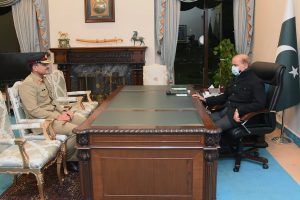Angry and disillusioned. This is the prevalent sentiment across much of Pakistan, especially in Punjab, the country’s heartland. Stoked by a years-long economic crisis that has pushed millions below the poverty line and an electoral process that was neither free nor fair, discontent continues to grow. While the formation of a new government following elections and the continued imprisonment of former Prime Minister Imran Khan has created an illusion of stability, the country remains on the boil from Peshawar to Gwadar and Islamabad to Karachi.
In just the last month, citizens in Pakistan-administered Kashmir have protested against rising inflation – more than four people have been killed – while farmers in Punjab, the country’s most populous province, have been on the streets, too. These events occurred despite a decline in inflation, which has come down from a peak of 38 percent in May 2023 to around 17 percent in April 2024, and a stabilization of the currency.
While the near-term economic stability has calmed nerves, the country will require additional injections of liquidity from multilateral and bilateral institutions in the coming weeks. To unlock these flows, Pakistan is engaged in early conversations with the International Monetary Fund (IMF) to negotiate another program, which will likely include additional austerity and taxation measures. As a result, it is expected that ordinary citizens are likely to face additional pain in the coming weeks, testing the political stability of Shehbaz Sharif’s new government.
An ongoing crisis is roiling the judiciary as well. Six judges of the Islamabad High Court (IHC) have formally complained to the Supreme Judicial Council (SJC) – a body of the superior judiciary – about the executive’s interference in judicial affairs. Political leaders, some of whom are believed to be close to the military, are now publicly targeting judges, prompting a supreme court judge to ask the attorney general of Pakistan whether the government has “started threatening the judges through proxies?”
It is not Sharif but General Asim Munir, leader of Pakistan’s army and inarguably the most powerful man in the country, who needs this new variation of a hybrid democracy to resolve the ongoing economic crisis in Pakistan. Since being appointed army chief in November 2022, Munir (and by extension the Pakistan Army) has taken even more control of policymaking in the country, especially in the economic domain. As a result, resolving the multifaceted crises across the political economy is not only critical to calming ordinary people, but to instilling some level of confidence within the military itself.

































